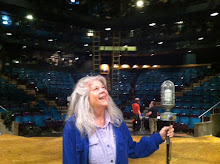I've become a little worried that the art of stage management has become less important to producers and directors than it briefly became. I'm seeing a movement that seems to take the stage manager out of the equation, ignoring the vast knowledge and experience a stage manager can bring to a project. I'm wondering if this has to do with ego. Maybe it all has to do with control.
This is a complicated topic. Some directors need to micro-manage to the extent that they are actually doing some of the work a stage manager could do for them. Oh, you want examples? Well... character/scene breakdowns, scheduling and time management. They are not trusting the stage managers to look out for the show. They seem to be afraid of losing some kind of control when in fact the stage managers can easily take over these jobs and free the directors to simply create.
Some theatre companies don't want the stage managers to give notes to the actors after opening. They hire assistant directors to watch the show once a week and give notes. Okay.. makes my job easier in a way... but on a nightly basis this doesn't serve the production as much as the someone who is dedicated and is watching 8 shows a week. A stage manager should be the first to notice when an actor is going off track and can fix it with a quick note at fight call. The rest of the company doesn't have to wait for the assistant director to show up to "fix" the show. The show won't need fixing! (When stage managers give nightly notes we have the added benefit of reducing the actors' stress because a simple fix has been solved in a day.. not in a week.)
The point, I believe, is that the producers are hiring technical stage managers who are very good, but lack a sense of the ultimate goal of theatre: To communicate, to educate, to change the way the audience thinks and to move the audience to action. Producers have lost faith in stage managers and look to an outside eye to note and "fix."
I'm not sure the actors appreciate this interference from someone who is not with them night after night. I think the actors need the eye of someone they've come to trust in rehearsal, tech and performance...
I think the producers are now looking for "less" in a stage manager and not "more."
I know some designers are delighted by this. "Call my cue on this word." "But," the stage manager says..."Sometimes he moves more slowly to this spot and your cue will put him in darkness." "NO" the designer says... call my cue on this word." I've run into this. I don't understand the didactic nature of the instruction. I overheard Jules Fisher say to his colleague Peggy Eisenhower once about me, "leave her alone, she knows where to call the cue." Yeah, he knew I knew what I was doing. But now, designers have no faith and want no help and won't let the stage manager help to figure out exactly where that particular cue should be called. It feels like it is all about power. I don't understand. I thought we were a collaborative group... I thought we were working together to make the show perfect.
I'm not sure the theatre world has yet noticed, but I have. The scope and work and job of the stage manager is becoming that of a technician. Again.
We once were artists.
Friday, March 25, 2011
Subscribe to:
Post Comments (Atom)

Sounds ominous. And it sounds like the way a certain British Director we know treats stage managers.
ReplyDeletexo
Claudia